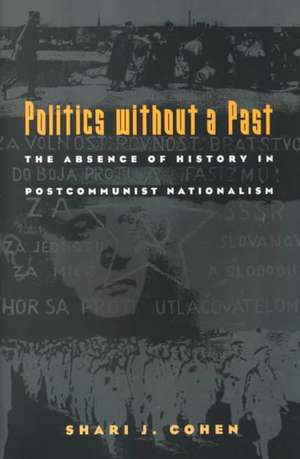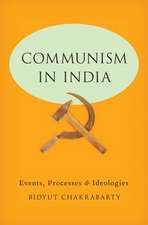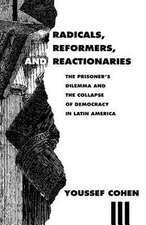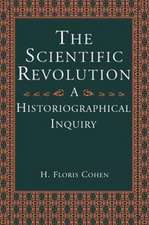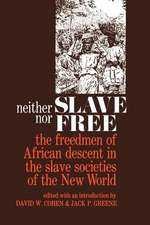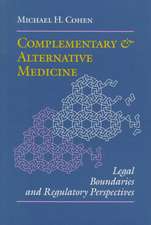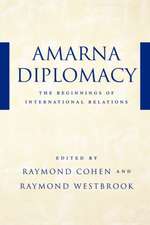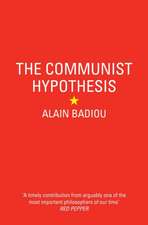Politics without a Past – The Absence of History in Postcommunist Nationalism
Autor Shari J. Cohenen Limba Engleză Paperback – 21 noi 1999
In contrast to the conventional wisdom, which locates the roots of widespread intra-national strife in deeply rooted national identities from the past, Cohen argues that a profound ideological vacuum has fuelled destructive tension throughout post-communist Europe and the former Soviet Union. She uses Slovakia as a case study to reveal that communist regimes bequeathed an insidious form of historical amnesia to the majority of the political elite and the societies they govern. Slovakia was particularly vulnerable to communist intervention since its pre-communist national consciousness was so weak and its only period of statehood prior to 1993 was as a Nazi puppet-state.
To demonstrate her argument, Cohen focuses on Slovakia's failure to forge a collective memory of the World War II experience. She shows how communist socialisation prevented Slovaks from tying their individual family stories-of the Jewish deportations, of the anti-Nazi resistance, or of serving in the wartime government-to a larger historical narrative shared with others, leaving them bereft of historical or moral bearings. Politics without a Past develops an analytical framework that will be important for future research in Eastern Europe, the former Soviet Union, and beyond. Scholars in political science, history, East European and post-Soviet studies will find Cohen's methodology and conclusions enlightening. For policymakers, diplomats, and journalists who deal with the region, she offers valuable insights into the elusive nature of post-communist societies.
Preț: 265.02 lei
Nou
Puncte Express: 398
Preț estimativ în valută:
50.71€ • 52.95$ • 41.88£
50.71€ • 52.95$ • 41.88£
Carte tipărită la comandă
Livrare economică 15-29 aprilie
Preluare comenzi: 021 569.72.76
Specificații
ISBN-13: 9780822323990
ISBN-10: 0822323990
Pagini: 296
Dimensiuni: 166 x 232 x 25 mm
Greutate: 0.47 kg
Ediția:New.
Editura: MD – Duke University Press
ISBN-10: 0822323990
Pagini: 296
Dimensiuni: 166 x 232 x 25 mm
Greutate: 0.47 kg
Ediția:New.
Editura: MD – Duke University Press
Recenzii
"A pioneering study. This book should be required reading for journalists and diplomats who deal with post-communist Europe. - James Felak, University of Washington
"Cohen's deft and ingenious examination of the historical, political, biographical, and moral features of Slovakia's present and recent past, in particular the peculiar and powerful quality and impact of the Leninist legacy, contributes substantially to our grasp of this area's novel political sociology."-Ken Jowitt, University of California, Berkeley
"This book is well documented and, for anyone interested in the current travails of Eastern Europe in general and Slovakia in particular, this is a valuable source text."--Morning Star, 23 October, 2000
"A pioneering study. This book should be required reading for journalists and diplomats who deal with post-communist Europe." - James Felak, University of Washington "Cohen's deft and ingenious examination of the historical, political, biographical, and moral features of Slovakia's present and recent past, in particular the peculiar and powerful quality and impact of the Leninist legacy, contributes substantially to our grasp of this area's novel political sociology."-Ken Jowitt, University of California, Berkeley" "This book is well documented and, for anyone interested in the current travails of Eastern Europe in general and Slovakia in particular, this is a valuable source text."--Morning Star, 23 October, 2000
"Cohen's deft and ingenious examination of the historical, political, biographical, and moral features of Slovakia's present and recent past, in particular the peculiar and powerful quality and impact of the Leninist legacy, contributes substantially to our grasp of this area's novel political sociology."-Ken Jowitt, University of California, Berkeley
"This book is well documented and, for anyone interested in the current travails of Eastern Europe in general and Slovakia in particular, this is a valuable source text."--Morning Star, 23 October, 2000
"A pioneering study. This book should be required reading for journalists and diplomats who deal with post-communist Europe." - James Felak, University of Washington "Cohen's deft and ingenious examination of the historical, political, biographical, and moral features of Slovakia's present and recent past, in particular the peculiar and powerful quality and impact of the Leninist legacy, contributes substantially to our grasp of this area's novel political sociology."-Ken Jowitt, University of California, Berkeley" "This book is well documented and, for anyone interested in the current travails of Eastern Europe in general and Slovakia in particular, this is a valuable source text."--Morning Star, 23 October, 2000
Textul de pe ultima copertă
"Cohen's deft and ingenious examination of the historical, political, biographical, and moral features of Slovakia's present and recent past, in particular the peculiar and powerful quality and impact of the Leninist legacy, contributes substantially to our grasp of this area's novel political sociology."--Ken Jowitt, University of California, Berkeley
Notă biografică
Descriere
Argues that an ideological vacuum has fueled the problems throughout postcommunist Europe and the former Soviet Union
